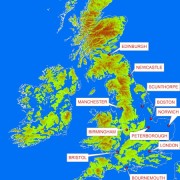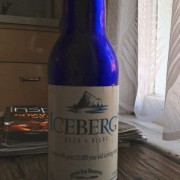 Yesterday I went out on a plane to check out the ice situation offshore. Despite a favourable forecast, Mother Nature decided to hide her icy secrets in an extensive layer of fog. After being in the air for over 5 hours, the only icebergs I was able to see were within half a mile of shore. Those further offshore were shrouded in mists and mystery, pending further visual investigation, I decided to do some research online.
Yesterday I went out on a plane to check out the ice situation offshore. Despite a favourable forecast, Mother Nature decided to hide her icy secrets in an extensive layer of fog. After being in the air for over 5 hours, the only icebergs I was able to see were within half a mile of shore. Those further offshore were shrouded in mists and mystery, pending further visual investigation, I decided to do some research online.
Our present challenges started two years ago, long before I knew I would be doing this row, when a chunk of ice four times the size of Manhattan calved away from the Petermann Glacier in Greenland. It would be tempting to immediately attribute this breaking up of ancient glaciers to climate change, but I want to be sure of my facts before I do so. It does the cause no good to try and establish tenuous links between naturally occurring phenomena and the impacts of humankind. I haven’t had much time to research this (several years of postgraduate study would have been handy) but here is what I have managed to find out in a few short hours online.
“About 33 per cent of the Petersen Ice Shelf has eroded away between 2005 and 2008.”
“Issues may also arise if the ice islands make their way south into navigable waters.”
The consequences could be dramatic, and the next 10 years will be decisive. If the Greenland ice sheet were to melt, it is projected by scientists that it would create a 23 feet rise in sea level.
 This map illustrates Britain if sea levels were to rise by 84 metres, i.e. if all the world’s ice melted. It would be nothing more than an archipelago of islands, with London relegated to the lost realm of Atlantis. This might sound far-fetched, but in 2009 scientists were predicting that the Arctic could become ice free within as little as a decade. (Do check out the video on that page, featuring polar explorer and all round good guy Pen Hadow.) The world has been ice-free before, and it could happen again. (More information and a climate animation here.)
This map illustrates Britain if sea levels were to rise by 84 metres, i.e. if all the world’s ice melted. It would be nothing more than an archipelago of islands, with London relegated to the lost realm of Atlantis. This might sound far-fetched, but in 2009 scientists were predicting that the Arctic could become ice free within as little as a decade. (Do check out the video on that page, featuring polar explorer and all round good guy Pen Hadow.) The world has been ice-free before, and it could happen again. (More information and a climate animation here.)
This is uncharted territory for humankind, so by necessity there is a certain amount of guesswork involved as to the consequences – and the causes – of our rising temperatures. But how much are we willing to gamble with the future existence of our species while we make up our minds? The worst case scenario would make our present navigational travails seem supremely insignificant by comparison.
In the mean time, the OAR team is furthering their investigation by sampling the local Quidi Vidi beer, made from 25,000-year-old iceberg water!

